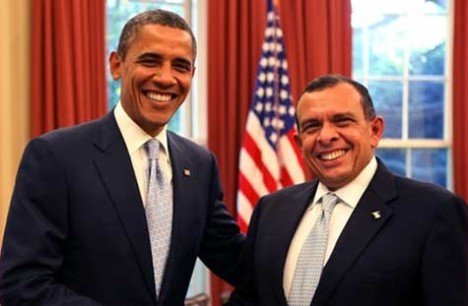TEGUCIGALPA — It’s not a controversial argument that the November 24 general election is the most important Central American election of the year, if not the most important since 2009, for the region. But it’s certainly of vital importance for US foreign policy — and much more than the three additional upcoming elections next spring in Central America (Costa Rica, El Salvador and Panamá).![]()
![]()
The coup that overthrew former president Manuel Zelaya in June 2009 was in many ways the first important foreign policy crisis for the administration of US president Barack Obama. Views differ incredibly as to whether Obama and US secretary of state Hillary Clinton succeeded in handling the crisis. Though the US government joined virtually the entire international community in condemning the coup and voicing support for Zelaya’s return to office, the United States ultimately backed down on threats to refuse to recognize the November 2009 election, despite threatening not to recognize those elections in talks with Honduras’s interim president between June 2009 and January 2010, Roberto Micheletti.
It was clear that top US policymakers weren’t happy with Zelaya’s increasing turn toward stridently anti-American leftist regimes, including Venezuela, which was then under the leadership of Hugo Chávez, and Zelaya’s decision to join the Alianza Bolivariana para los Pueblos de Nuestra América (ALBA, Bolivarian Alliance of the Americas) was a turn away from the United States and toward Venezuela, Bolivia, Cuba and others in the region. While Zelaya would be a fool to turn away the favorable terms of Chávez’s Petrocaribe scheme that subsidizes fuel (50% down, 50% to be paid far off in the future), and even his conservative successor continued to accept Petrocaribe fuel, he pulled Honduras far closer to the hardcore left than it had ever been in its history.
As the subsequent post-Zelaya elections approached, however, it was clear that the United States was more comfortable with the impending victory of Porfirio Lobo Sosa, the candidate of the Partido Nacional (PN, National Party). When Lobo Sosa (pictured above with Obama) won that election, US-Honduran relations went back to business as usual — and then some.
Honduras is, in many ways, the key to US policy in Central America. Its Soto Cano air force base is a key military transport point between the United States and the rest of Latin America — the air base itself came into modern existence in 1981, when the US government used Honduras as a staging point for Contra incursions against the Soviet-backed Sandinista forces in Nicaragua. Don’t let its relatively small size fool you, either. If you think a country with a population of just eight million people can’t be relevant to US foreign policy, just look at Israel — it’s a country with just six million.
Four years after the mixed US response to the coup, Hondurans are preparing to elect a new president and all 128 members of the Congreso Nacional (National Congress), and the consequences couldn’t be greater for US-Honduran relations.
Current polls show that it’s a three person-race, with the National Party’s Juan Orlando Hernández, the president of the National Congress, essentially tied with Xiomara Castro de Zelaya, the wife of the former president. Castro de Zelaya is running as the candidate of a broad leftist movement, the Frente Nacional de Resistencia Popular (FNRP, National Popular Resistance Front), which is now organized as a full political party, the Partido Libertad y Refundación (LIBRE, Liberty and Refoundation Party). Lagging behind is attorney Mauricio Villeda, the candidate of Zelaya’s former party, the Partido Liberal (PL, Liberal Party) and the son of a former social democratic Liberal president in the late 1950s and early 1960s.
Though Castro de Zelaya isn’t going out of her way to disparage the United States, and the United States hasn’t endorsed Hernández directly, US-Honduran relations will be much trickier if Castro de Zelaya wins the election.
But that doesn’t mean relations will necessarily be worse for the Honduran people. Continue reading So what’s the big deal about Honduras’s election?
